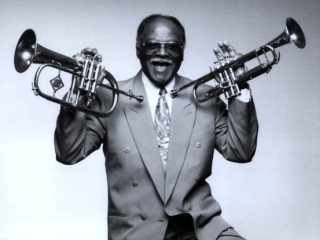
Clark Terry biography
Date of birth : 1920-12-14
Date of death : 2015-02-21
Birthplace : St. Louis, Missouri, U.S.
Nationality : American
Category : Arts and Entertainment
Last modified : 2023-12-14
Credited as : jazz musician, swing and bop trumpeter, Grammy Lifetime Achievement Award
2 votes so far
Clark Terry: A Trumpeter's Odyssey Through Jazz Mastery
Clark Terry was an American swing and bop trumpeter, a pioneer of the flugelhorn in jazz, educator, NEA Jazz Masters inductee, and recipient of the 2010 Grammy Lifetime Achievement Award. Only three other trumpet players in history have ever received the Grammy Lifetime Achievement Award: Louis Armstrong (Clark's old mentor), Miles Davis (who Clark mentored), and Dizzy Gillespie (who often described Clark as the greatest jazz trumpet player on earth).
The Humble Beginnings
In the heart of St. Louis, Missouri, on December 14, 1920, a musical prodigy named Clark Terry was born into humble circumstances. Constructing his first trumpet from a piece of garden hose and a cut-off pipe for a mouthpiece, young Terry's early music echoed through the neighborhood until the community pitched in to buy him a real instrument. This was the inception of a journey marked by innovation and a love for the trumpet that would shape Terry's destiny.
The School of Hard Knocks and High Notes
While attending Vachon High School, Terry's musical path intertwined with the likes of Ernie Wilkins, a future principal arranger for Count Basie. Simultaneously dreaming of becoming a boxer, Terry ultimately chose the trumpet over the boxing ring. His relentless practice, inspired by a love for speed and precision, became the foundation for a career that would defy expectations.
Navigating the Navy and Swinging with Basie
In 1942, Terry entered the United States Navy, playing alongside luminaries like Willie Smith and Gerald Wilson. Post-Navy, he toured with Lionel Hampton and later joined Count Basie's orchestra, leaving an indelible mark on Basie's sound. Terry's influence extended beyond his trumpet prowess; he played a pivotal role in bringing arranger Ernie Wilkins into the Basie fold.
Ellingtonia University
Duke Ellington recognized Terry's unique sound in 1951, leading to a nearly nine-year stint that Terry fondly dubbed "attending the University of Ellingtonia." Ellington, known for weaving individual voices into his sonic tapestry, seamlessly integrated Terry's trumpet, marking a pivotal phase in Terry's evolution as a musician and arranger.
NBC and "Mumbles" Take Center Stage
In 1959, Terry embarked on a new chapter with Quincy Jones' orchestra before finding a home at NBC, where he became a fixture in the "Tonight Show" band. His nightly escapades in the "stump the band" segment and his trademark "Mumbles" act endeared him to audiences. Terry's comedic scat singing and virtuosic trumpet skills added a touch of magic to late-night television.
The Big B-A-D Band and Global Diplomacy
As the "Tonight Show" moved to California in 1972, Terry opted to stay in New York, forming his Big B-A-D Band. Financial challenges aside, the band's European tours and a Carnegie Hall concert solidified Terry's reputation as a musical force. Simultaneously, he embarked on international tours as a musical ambassador, spreading jazz across the globe.
Educating and Inspiring Future Generations
While at NBC, Terry initiated a lifelong commitment to jazz education. His efforts included mentoring jazz icons like Wynton and Branford Marsalis, establishing the Clark Terry Institute of Jazz Studies, and inspiring countless students through appearances at schools and colleges nationwide.
The Flugelhorn Renaissance
Terry's legacy extends beyond his trumpet virtuosity; he is credited with reintroducing the flugelhorn to jazz. His collaboration with Selmer Brass produced the first flugelhorn in the United States, revolutionizing the jazz landscape. Terry's influence also led to trumpeters receiving "doubling" pay when playing both horns, mirroring the practice of reed players.
A Trumpeter's Homage
In his 1988 album Portraits, Terry pays homage to his influences, including Louis Armstrong, Bunny Berigan, Roy Eldridge, Miles Davis, Harry Edison, and Harry James. His mastery of triple-tonguing and circular breathing, coupled with an unwavering commitment to musical excellence, solidifies Clark Terry's place as one of the most influential and prolific jazz musicians in history.
A Lasting Legacy
Clark Terry's remarkable journey through life and career illuminates the indomitable spirit of a jazz legend. From improvised childhood instruments to global stages, Terry's impact resonates in the hearts of musicians and audiences alike. His enduring legacy is a testament to the transformative power of music and the unwavering dedication of a man who lived and breathed jazz.
















